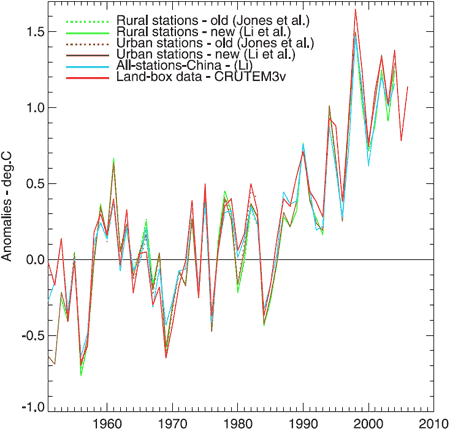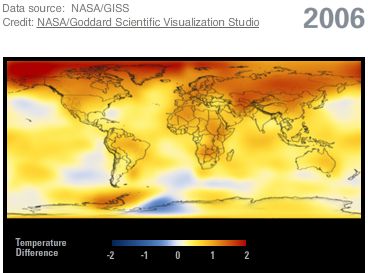You are putting a lot of faith on OBSERVATIONAL data which is not scientific at all. When comparing observational data to actual (not computer models) data it is like comparing apples to oranges as one uses a scientific know quantity against an opinion or snapshot by an individual (in a lot of cases) which is colored by many(human) factors. Let's say we accept the premise the Earth has indeed warmed by 2C in the past 100 years, what percentage of that is caused by natural causes, or difference in measurement tools, time of day reporting, quality of observations, consistency of observations at differing points of the world, addition of sites not previously used or elimination of some sites, accounting for differing datasets parameters, sun cylcle amplitude, the fact we were coming out of a mini ice age in large portions of the world after 1825 (give or take), and finally the UHI adjustments effect from massive changes in land usage and changes? The alarmist theory on AGW is largely based on unquantifiable and unproven "feedback loops" or heat multipliers based on model projections or else just tossed out because we "don't know any other cause". It would be well to remember the saying that correlation is not causation and that theories are just opinions yet to be proven by facts. To completely try to revamp our economic system to achieve an end which may not even be desirable, is foolhardy IMO. Remember the Arctic Icecap was supposed to be completely gone ( by many of the most prominent AGW proponents) in summer by 2013-15 and there is still many millions of square miles of ice there every September (albeit it less than the period before 2000) before the ice starts growing again. Once the AMO turns into it's cold phase, we will see the increase again of the Arctic Ice back to 1970's levels. I respect your belief in the science as you see it, but I just happen to disagree with your conclusions and would hope the attempted silencing of skeptical scientists by some prominent people does not continue as we have seen recently. Best way to go is keep studying, watch unbiased data like satellite measurements and see where it takes us in the next 10-20 years, I hardly think the doom and gloom preached by some will happen in that short time period. I do apologize to the mods and others here that could care less about this topic in a winter weather thread and will not post on it here anymore, thanks for your patience
I've heard all of this rhetoric before...
"You are putting a lot of faith on OBSERVATIONAL data which is not scientific at all. When comparing observational data to actual"
"...watch unbiased data like satellite measurements..."
You do in fact realize that observational data is practically all we have in the last 150 years or so, the resolution of proxies for ex is not adequate enough to describe intraseasonal-subannual variability and is fraught with far more uncertainty and is entirely state-dependent, the climate system's response to an El Nino millennia (& even centuries) from now will be completely different than what it is at the present (precession (or the change in earth's position relative to a "fixed" object such as our star) and obliquity (refers to the change in earth's axial tilt over time (which varies between about 22 and 24.5 degrees) play a key role in modulating the system's internannual, phase locked ENSO expression. ENSO hasn't always been a key feature of earth's climate system, it's merely an expression forced in large part by the external forcings and resonances that drive/excite it, once these forcings and resonances change (along w/ the background climate itself) so will ENSO's character, and it's very likely that we will some day lose the ENSO phenomena altogether (although it's debatable when exactly this would occur)).
Wait, what is the "actual data" you're referring to? Am I missing something?
My guess is if you're referring to the
theoretical true values and/or satellite data, good luck with that, and if you think surface data contains a myriad of adjustments just wait until you see or work with satellite data, lol it's a mess. Aside from all the other aforementioned adjustments that occur w/ surface data & are often applied to the satellites, for example, although they offer coverage particularly in observationally sparse areas of the globe (such as the arctic and antarctic), unlike surface stations, satellites do not measure the same place on the earth at the exact same time of the day and many are incapable of penetrating through clouds/convection. Hence,
all satellite data has to be fitted to a computer model to account for the diurnal cycle since they can't make measurements at the same time of the day at the same place on the earth and their observations have to be fit in order to derive data for a desired pressure level. Additionally, satellites do not take direct measurements in the sense that they are not embedded in the medium of interest, thus yet another suite assumptions and bias corrections has to be made before their data can be properly assimilated. Even after this juncture, more adjustments are made to homogenize the satellite data with the surface record, which is far more reliable, stable, and has a length of record that dwarfs the satellites. It's pretty evident even from an operational standpoint, while useful as a first-guess approximation, filling gaps in coverage, and field testing adjustments, the satellite data isn't all the great as it seems. For example, am I the only one here that finds it at least a little peculiar that in the medium range preceding most significant weather events where we are watching a shortwave disturbance, ULL, or what have you over a data sparse region dominated by satellite observations only, such as the arctic or North Pacific, that we often see massive shifts in the models once such system is aptly "sampled" by the upper air &/or surface network over North America? Why do you suppose that is? Hmmm...if the satellite data actually was that good then why are there such wild swings in guidance once surface data is input into the models? If anything else, that alone should tell you something about the relative reliability of these data sources, but I digress...


